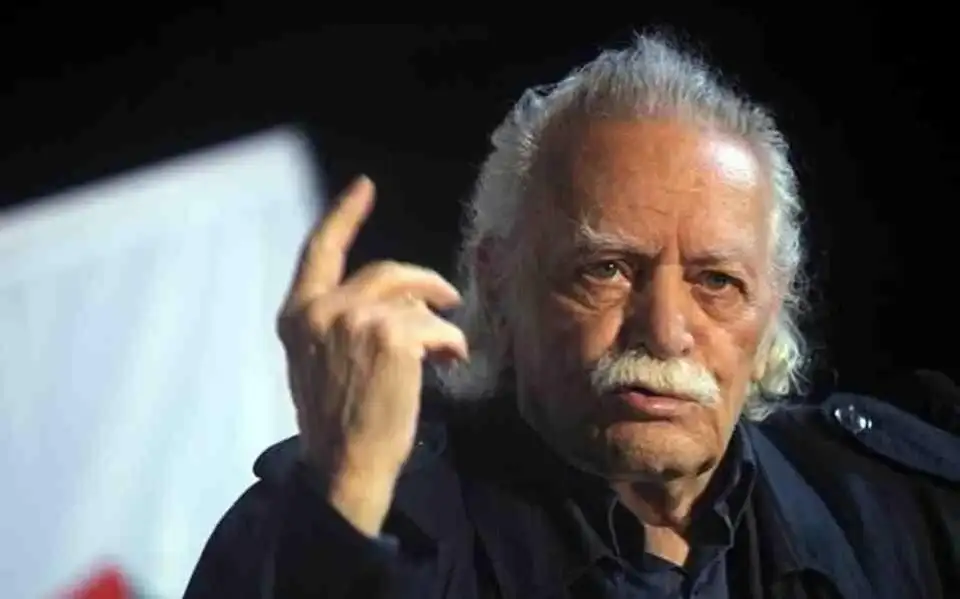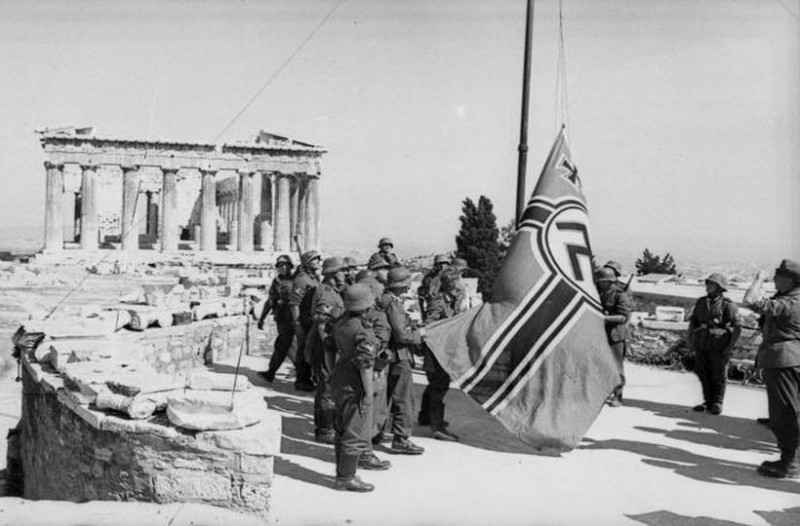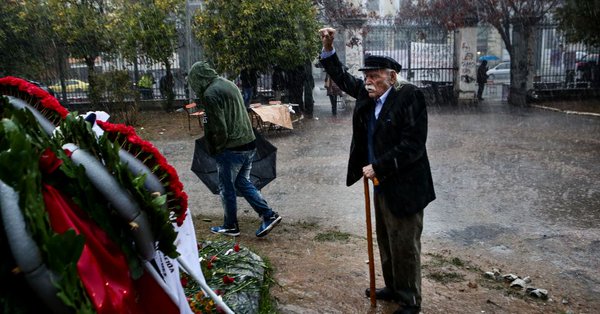
Manolis Glezos is widely regarded as one of the most courageous figures in modern Greek history, embodying the spirit of resistance, patriotism, and unwavering commitment to freedom. Born in 1922 on the scenic island of Naxos, Greece, Glezos’s life is a profound narrative of rebellion against tyranny and dedication to social justice. His defining moment came in 1941 when, at just 18 years old, he and a fellow resistance fighter climbed the Acropolis to remove the Nazi swastika flag, a bold act that ignited hope and defiance among Greeks under Axis occupation. This historic deed made Manolis Glezos an enduring icon in the global story of resistance against fascism.
Early Life and Formation of Ideals
Growing up in the mountainous village of Apiranthos on Naxos, Manolis Glezos was exposed early to a community steeped in tradition, resilience, and political awareness. His family was known for their progressive views, and discussions about freedom and justice were common in their household. Glezos’s formative years coincided with a turbulent era in Greek and European history, with the rise of fascism and the outbreak of World War II. The socio-political climate, combined with his personal values, motivated him to actively oppose any form of oppression.
Upon moving to Athens to continue his education, Glezos joined youth groups that opposed fascist ideologies. It was during this period that his political awareness deepened, shaping his conviction that standing up to tyranny was not only necessary but a moral imperative.

The Night That Changed History: The Acropolis Flag Incident
On the night of May 30, 1941, the young Manolis Glezos and his friend Apostolos Santas executed a daring and unprecedented act of resistance. Despite the grave risks, they climbed the heavily guarded Acropolis in Nazi-occupied Athens and tore down the swastika flag that symbolized the oppressive German occupation. This symbolic act was the first public and direct defiance against the Axis powers in Greece during World War II.
The significance of this event extended far beyond the physical removal of the flag. It became a beacon of hope and courage for the Greek people who were suffering under occupation. The boldness of Glezos and Santas’s deed encouraged the formation and growth of resistance groups all across Greece. The Nazi regime was incensed by the act and sentenced both young men to death in absentia. However, their resolve did not waver, and this episode cemented Manolis Glezos’s status as a symbol of Greek resilience.
Resistance and Personal Sacrifice
Following the Acropolis incident, Glezos became deeply involved in the organized resistance movement against the Axis occupation, joining the National Liberation Front (EAM). His activities included distributing underground newspapers, organizing sabotage operations, and recruiting fellow Greeks to join the fight for liberation. His courage, however, came with severe personal costs.
Glezos was arrested multiple times by Nazi and later Greek authorities. In 1942, during one of his imprisonments, he endured brutal torture aimed at breaking his spirit. Despite the physical and psychological abuse, he refused to betray his comrades or abandon the cause. His injuries from this torture would affect his health throughout his life. Even after the war, during the Greek Civil War (1946–1949) and under the military dictatorship of 1967–1974, Glezos remained active in political and resistance efforts, often facing persecution.
Political Life and Continued Activism
With the end of the military junta and the restoration of democracy in Greece, Manolis Glezos transitioned from resistance fighter to politician, continuing his lifelong advocacy for justice and social equity. He was elected multiple times to the Hellenic Parliament, representing leftist parties, and became a Member of the European Parliament. In these roles, Glezos consistently pushed for progressive reforms, workers’ rights, and, importantly, the recognition and compensation for the suffering endured by Greece during the Nazi occupation.
One of his major political campaigns focused on demanding reparations from Germany for war damages. This was a complex and often controversial issue in Greek politics, but Glezos pursued it tirelessly, emphasizing the importance of historical justice. His work in this area earned him international recognition and respect.
Glezos’s Role During the Greek Civil War and Beyond
After World War II ended, Greece quickly descended into a brutal civil war between communist and government forces, a period marked by widespread violence and political instability. Manolis Glezos remained steadfast in his political beliefs, supporting the left-wing resistance fighters who had struggled alongside him during the occupation. Despite intense persecution, including repeated arrests and imprisonment, he refused to abandon his vision of a democratic and socially just Greece. His resilience during this turbulent time demonstrated not only his commitment to his ideals but also his unwavering courage in the face of ongoing oppression.
Intellectual Contributions and Writings
In addition to his activism and political career, Manolis Glezos was a dedicated writer and intellectual who contributed significantly to the preservation of modern Greek history. Through his numerous books, essays, and speeches, he chronicled the hardships of the occupation, the resistance efforts, and the political struggles that followed. His writings provide a vivid, first-hand account of a critical era in Greek history, offering future generations an invaluable perspective on the fight for freedom. Glezos’s literary work not only honors those who sacrificed for Greece but also serves as a call to remain vigilant against injustice in any form.

International Recognition and Influence
Over the decades, Manolis Glezos gained international recognition as a symbol of resistance against fascism and tyranny. His story inspired freedom fighters and human rights activists around the world, earning him awards and honors from numerous countries. Glezos’s advocacy extended beyond Greece’s borders, particularly through his role in the European Parliament, where he pushed for peace, social justice, and reparations for war victims. His global impact underscores the universal relevance of his message: that ordinary people, through courage and determination, can challenge injustice and shape the course of history.
Legacy and Cultural Impact
Manolis Glezos’s death in March 2020 marked the passing of a living legend, but his legacy continues to inspire. Across Greece and beyond, his life is celebrated as a testament to the power of courage and conviction in the face of overwhelming adversity. Streets, schools, and public spaces bear his name, and his story is taught in history classes to ensure new generations understand the price of freedom.
His contributions were not limited to politics and resistance; Glezos was also a prolific writer and historian. He authored numerous books documenting the resistance movement, the Nazi occupation, and Greece’s political evolution in the 20th century. His writings remain valuable resources for scholars and enthusiasts of modern Greek history.
For those interested in learning more about the resistance and Greece’s fight for freedom, authoritative resources such as the Hellenic Ministry of Culture and Sports provide extensive archives and educational materials.
Manolis Glezos in Modern Memory
Today, Manolis Glezos is more than a historical figure; he is a symbol of the enduring struggle for democracy and human rights worldwide. His story resonates with anyone facing injustice or fighting against oppression. In an era where the lessons of history can be overshadowed, Glezos’s life reminds us that individual bravery can spark collective change.
Internationally, his name is recognized alongside other iconic resistance figures. His example continues to inspire activists and politicians dedicated to defending freedom and dignity.
Frequently Asked Questions (FAQ)
1. Who was Manolis Glezos?
Manolis Glezos was a Greek resistance fighter, politician, and author known for his daring act of removing the Nazi flag from the Acropolis in 1941 and his lifelong fight against oppression.
2. What was the significance of the Acropolis flag removal?
The removal of the Nazi flag symbolized Greece’s first direct act of resistance against the Axis occupation, inspiring widespread defiance and hope among Greeks.
3. How did Glezos contribute after World War II?
He served as a member of the Greek Parliament and the European Parliament, advocating for reparations and social justice, while also documenting the history of the resistance.
4. What challenges did Manolis Glezos face?
He was arrested and tortured by Nazi forces, persecuted during the Greek Civil War and military dictatorship, and continuously faced political opposition throughout his life.
5. Where can I learn more about Greek resistance history?
The Hellenic Ministry of Culture and Sports offers extensive resources, archives, and educational content on Greece’s history during World War II and resistance movements.
6. Why is Manolis Glezos still relevant today?
His life exemplifies courage against tyranny and inspires contemporary movements for democracy and human rights worldwide.




